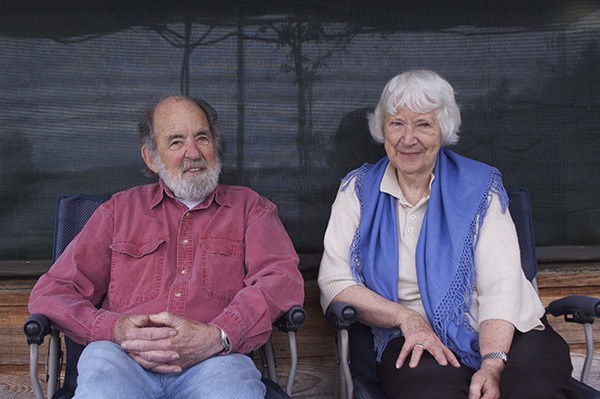If your New Year’s Resolutions include enlivening your intellect and indulging your appetite to learn something new, you’re in luck. Lopez Island’s first annual Winter Lecture Series kicks off this weekend with the first of four monthly lectures.
Created and presented by Lopez Hamlet, the four one-hour lectures will be held at The Gathering Place on Sunday afternoons at 2 p.m., January through April. Open to the whole community, the lectures are free.
“The idea behind the series was simple,” states Charlie Janeway, co-chair of The Hamlet Board of Directors. “Warm up the cold winter months by offering excellent speakers, tantalizing topics and an inviting place to enjoy them. We think we’ve hit the jackpot this first year.”
The line-up:
January 11: Alie and Oscar Smaalders, Memories of WWII in Nazi-occupied Netherlands
February 8: Richard Fagen, Quo Vadis? From Rome to the Pyramids, Tourism 2,000 Years Ago
March 22: Russel Barsh and Madrona Murphy, Sailing the Salish Sea in the Dog Days
April 12: Nancy McCoy: Memorable Islanders, Lopez and Beyond
Alie and Oscar Smaalders
With fewer and fewer people old enough to have memories of World War II, Alie and Oscar’s lectures are increasingly important. “Many of the people who were a bit older than we are, soldiers and eyewitnesses, are gone now,” says Alie.
She and Oscar were between the ages of 16 and 21 during the occupation and lived in different parts of The Netherlands. (In fact, they wouldn’t meet until years later when both were attending UCLA in Los Angeles.)
With two distinct sets of memories, their lecture is a valuable opportunity to hear first-hand experiences about one of the most traumatic wars in human history.
Richard Fagen
Being a professor of Political Science and Latin American Studies at Stanford University for 32 years prepared Richard well for a second “career” as a lecturer. Following his retirement in 1993, he and his wife Deborah moved to Lopez. The very next year he began lecturing, mainly aboard small expedition ships bound for destinations such as Cuba, New Guinea and Antarctica. His topics on his ensuing 38 trips: exploration and history.
Richard titled his lecture Quo Vadis: From Rome to the Pyramids, Tourism 2,000 Years Ago. He developed the topic while sailing in the Mediterranean 15 years ago. “In a certain way, tourism made sense back then. Well-to-do Romans knew they had this empire and they thought, ‘let’s go see the place!’ They wanted to see the sphinx, to travel the Nile, to go to Alexandria. It was fun to develop material that wasn’t the same old stuff.” Richard will have a handout. Please bring reading glasses if you need them.
Russel Barsh and Madrona Murphy
Russel and Madrona, experts on Native people in this region, will bring that topic to life in their lecture: Sailing the Salish Seas in the Dog Days.
Dog days? Russel says the term, a play on words, refers to the time before Europeans came to the Americas. “Before Europeans brought horses to Mexico, Native people in the prairies used dog sledges to move their families around, while here in the islands, Native families wore clothing woven from dog hair. We also like to highlight that seafaring in the Salish Sea is far older than European ships with canvas sails. Native people were already going everywhere by sailing canoes in the 1790s when the first Europeans arrived. It’s not what we were taught in grade school!”
Russel studied at Harvard, taught at the University of Washington and worked for many years at the United Nations on indigenous peoples and their ecosystems. Co-presenter Madrona Murphy, a Reed College graduate in botany and political science, will focus on Native agriculture, gardening and farming. “Our presentation grows out of our interest in how people transformed the islands, and telling that story,” says the couple.
Nancy McCoy
Nancy’s lecture picks up where Russel and Madrona’s leaves off, with European settlers’ arrival in the San Juan Islands.
Nancy is well suited to speak on the topic. She organized and set up The Lopez Museum, beginning as a volunteer, writing grants and eventually was funded as its first director. She led the museum for 24 years. “I love the word resourcefulness,” she says. “It describes so much of what happened out here.”
A sampling of tales she will share: Amelia Chadwick, a Native woman, who married a Civil War veteran and homesteaded at Watmough Head; and Christopher Carruthers, postmaster at Mud Bay circa 1900. “Christopher was always trying to incite neighbors to feuds. He was a fascinating character,” Nancy reports. Some of Nancy’s stories have not been publicly shared before. “Of course there will be plenty of time for questions. Lopezians always have their own versions of a story.”
For more information about the Winter Lecture Series, contact The Hamlet at 468-2620. While the events are free, donations are always welcome. Space is limited.





